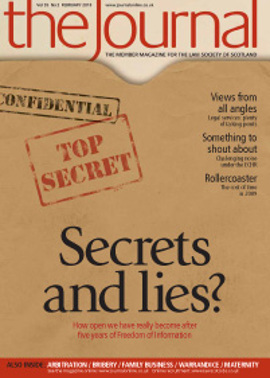Appreciation: Alfred Phillips

Alfred Phillips, who has died aged 88, was editor of the Journal for 25 years. He had a major influence on Scottish legal practice and on fellow practitioners. He was admired both professionally and in private life as a man of exceptional intelligence, integrity, intellectual curiosity and warmth.
Alfred was born in the Gorbals and left Govan High School as Dux. After graduating MA from Glasgow University, he was conscripted into the British army during the Second World War. As a captain in the Intelligence Corps he studied Japanese and became part of a team who translated the diaries of the Governor of Changi Jail in Singapore, prior to the war crimes trials.
On being demobbed, he returned to Scotland and studied law at Glasgow University. He joined the firm of Alexander Stone & Co, where he was senior partner for most of his professional life. During the 1950s he obtained an honours degree in sociology from the University of London as an external student. As a lawyer, Alfred Phillips was renowned for his professionalism, and for his insistence on logical analysis and the consistent application of principle in developing solutions to legal problems. In 1957 he recognised the need for a discussion forum for solicitors and founded The Conveyancing Review, which in turn merged with the Journal. Alfred continued to edit the Journal for 25 years. The quality of his articles and editorials – quirky, unconventional, and giving lawyers a glimpse of intellectual territories well beyond their normal reach – earned him huge respect across the legal profession in Scotland.
Legal documents in the 70s were worded in out-of-date language, full of redundant phraseology, and set out in a manner based largely on historical practice rather than any systematic structure. To address this, Alfred inaugurated the Society’s Styles Committee, which produced templates for legal documents for use across the profession. Some readers remember the yellow pages (styles with guidance notes) which appeared in the Journal during that period. The logic, freshness and clarity of these templates had a major impact on modernising legal practice across Scotland; and to this day, they still have a radical look when compared with some of the more traditional forms that continue to be used.
Alfred was always passionate about the need for lawyers to adhere to the highest ethical standards, and to value professional standards at a time when the whole concept of professionalism was under attack. He was influential in ensuring that professional ethics was given appropriate recognition in the Diploma in Legal Practice, established in 1980. His book, Professional Ethics for Scottish Solicitors, was used as a textbook on Diploma courses. Alfred himself lectured in the first year of the professional ethics class at Glasgow University, to ensure that the material was fully bedded in to the Diploma course.
Alfred could be said to have laid the foundations for the modern commercial lease in Scotland. The template developed via the Styles Committee set an overall structure that continues to be widely used; indeed many of the individual clauses can still be recognised within current styles. Beyond that, though, Alfred was influential in bringing about the reform of the Scots law of irritancy, which he recognised as a serious flaw in the context of the Scottish commercial lease.
Alfred’s considerable contribution to the Scottish legal profession and legal scholarship won official recognition with his appointment as an Honorary Research Fellow of Glasgow University and an Honorary Life Member of the Law Society of Scotland.
Having already published a general sociological analysis of legal practice, The Lawyer and Society, Alfred retired from general practice in 1994, the better to pursue his intellectual interests. His next book, Lawyers’ Language: How and Why Legal Language is Different, was published in 2003. His latest, Rainbow Societies of the West, is about human rights law in the context of central problems integral to contemporary society. So much of his personality is revealed in his writings: he was a deeply philosophical man with a powerful analytical brain, an endless thirst for knowledge, and a deep social and political engagement.
Alfred’s work, though, is only part of the story. The family was always his priority. He met Flora when she was asked to make up a tennis sixsome, and they married in September 1953. They had five children – Michael, Lawrence, Stephen, Louise and Richard – who shared in regular noisy debate with Alfred round the dinner table. From the early 1990s, he and Flora spent much of their time in Paris, immersing themselves in French culture.
Alfred’s intellectual approach was to challenge orthodoxies, vigorously pursuing innovative lines of thought. Both in his work and private life, he gave well considered, constructive advice to those around him. He was a man who was charismatic and, at the same time, unpretentious, approachable and comfortable in all social circles. His love of life, intellectual drive and strength of spirit remained to the very end of his life. He is survived by Flora and his four sons and daughter, three daughters-in-law, son-in-law and seven grandchildren.
Flora Phillips
In this issue
- More prejudicial than probative?
- Another age
- Resolution is the key
- On the record
- Chequing out
- ABS workout
- Know your books
- Family business and business families
- Forum of choice?
- A right to silence?
- What does it mean to be a solicitor?
- Traineeships down over 25%
- Law reform update
- From the Brussels office
- Appreciation: Alfred Phillips
- Appreciation: John Sinclair
- Training for success
- From here... to maternity
- Ask Ash
- The move in-house - do you have what it takes?
- Big decisions
- Balancing exercise
- Belief boundaries
- Details, details, details
- Scottish Solicitors' Discipline Tribunal
- Website review
- Book reviews
- Tougher regime
- No guarantees?
- Title insurance for insolvency practitioners
- PSG update






